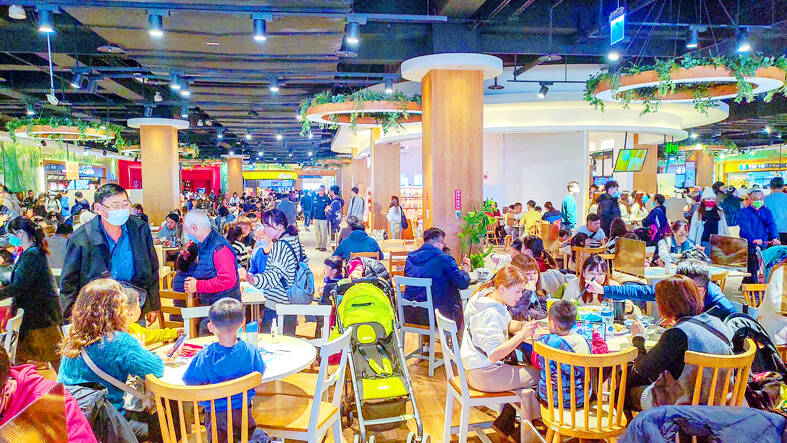A trial program is to limit air-conditioning at more than 1,300 establishments, where temperatures at meal times are to remain above 23°C, the Bureau of Energy said yesterday.
The trial would run until 2025 and complement regulations that since 2014 limit air-conditioning at 20 categories of establishments, with temperatures above 26°C, in a bid to reduce energy consumption in summer, the bureau said.
However, the regulations exempted restaurants and food courts in department stores from 7am to 9am, from 11am to 2pm and from 6pm to 9pm, it added.

Photo: Chang Hsuan-tse, Taipei Times
Operators that cool down their establishments to below 26°C face fines of NT$20,000 to NT$100,000 under the regulations, with repeat offenders facing higher fines.
However, fines imposed in the past few years showed there was “room for improvement,” a bureau official said yesterday.
The trial program would advise operators to cool down their facilities to about 23°C during meal times, the official said, adding that 1°C above or below the recommended temperature would also be accepted.
Bureau officials urged business owners to participate in the trial, saying that the agency would collect feedback from the public to ensure that people do not feel uncomfortable while dining in.
The trial would not impose additional fines, they added.
Some chain restaurant owners welcomed the announcement, saying that their target temperature has been 23°C to 24°C since higher food prices and electricity rates began affecting their business.
A chain restaurant public relations agent surnamed Chen (陳) said that restaurants inside malls cannot independently regulate their temperature, as they depend on the malls’ central air-condition systems.
However, the restaurants would try to comply with any new regulations, Chen said.
The bureau said that conference halls, previously unregulated, would also have to keep their temperature above 26°C.
The Taiwan External Trade Development Council, which manages the Taipei World Trade Center and the Taipei International Convention center, said it ensures that air-conditioners are set at “appropriate” temperatures to prevent excessive power use.

‘CHARM OFFENSIVE’: Beijing has been sending senior Chinese officials to Okinawa as part of efforts to influence public opinion against the US, the ‘Telegraph’ reported Beijing is believed to be sowing divisions in Japan’s Okinawa Prefecture to better facilitate an invasion of Taiwan, British newspaper the Telegraph reported on Saturday. Less than 750km from Taiwan, Okinawa hosts nearly 30,000 US troops who would likely “play a pivotal role should Beijing order the invasion of Taiwan,” it wrote. To prevent US intervention in an invasion, China is carrying out a “silent invasion” of Okinawa by stoking the flames of discontent among locals toward the US presence in the prefecture, it said. Beijing is also allegedly funding separatists in the region, including Chosuke Yara, the head of the Ryukyu Independence

UNITED: The premier said Trump’s tariff comments provided a great opportunity for the private and public sectors to come together to maintain the nation’s chip advantage The government is considering ways to assist the nation’s semiconductor industry or hosting collaborative projects with the private sector after US President Donald Trump threatened to impose a 100 percent tariff on chips exported to the US, Premier Cho Jung-tai (卓榮泰) said yesterday. Trump on Monday told Republican members of the US Congress about plans to impose sweeping tariffs on semiconductors, steel, aluminum, copper and pharmaceuticals “in the very near future.” “It’s time for the United States to return to the system that made us richer and more powerful than ever before,” Trump said at the Republican Issues Conference in Miami, Florida. “They

GOLDEN OPPORTUNITY: Taiwan must capitalize on the shock waves DeepSeek has sent through US markets to show it is a tech partner of Washington, a researcher said China’s reported breakthrough in artificial intelligence (AI) would prompt the US to seek a stronger alliance with Taiwan and Japan to secure its technological superiority, a Taiwanese researcher said yesterday. The launch of low-cost AI model DeepSeek (深度求索) on Monday sent US tech stocks tumbling, with chipmaker Nvidia Corp losing 16 percent of its value and the NASDAQ falling 612.46 points, or 3.07 percent, to close at 19,341.84 points. On the same day, the Philadelphia Stock Exchange Semiconductor Sector index dropped 488.7 points, or 9.15 percent, to close at 4,853.24 points. The launch of the Chinese chatbot proves that a competitor can

‘VERY SHALLOW’: The center of Saturday’s quake in Tainan’s Dongshan District hit at a depth of 7.7km, while yesterday’s in Nansai was at a depth of 8.1km, the CWA said Two magnitude 5.7 earthquakes that struck on Saturday night and yesterday morning were aftershocks triggered by a magnitude 6.4 quake on Tuesday last week, a seismologist said, adding that the epicenters of the aftershocks are moving westward. Saturday and yesterday’s earthquakes occurred as people were preparing for the Lunar New Year holiday this week. As of 10am yesterday, the Central Weather Administration (CWA) recorded 110 aftershocks from last week’s main earthquake, including six magnitude 5 to 6 quakes and 32 magnitude 4 to 5 tremors. Seventy-one of the earthquakes were smaller than magnitude 4. Thirty-one of the aftershocks were felt nationwide, while 79